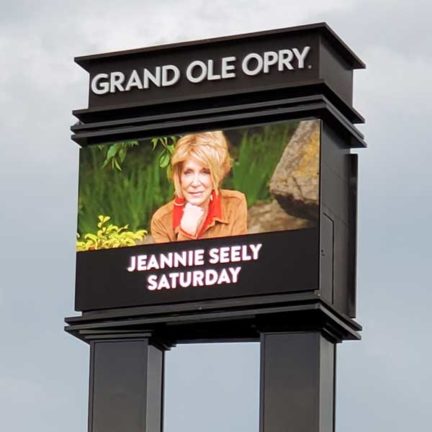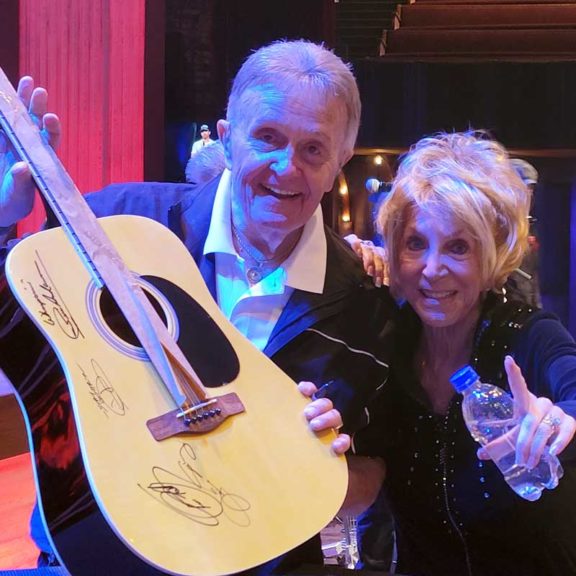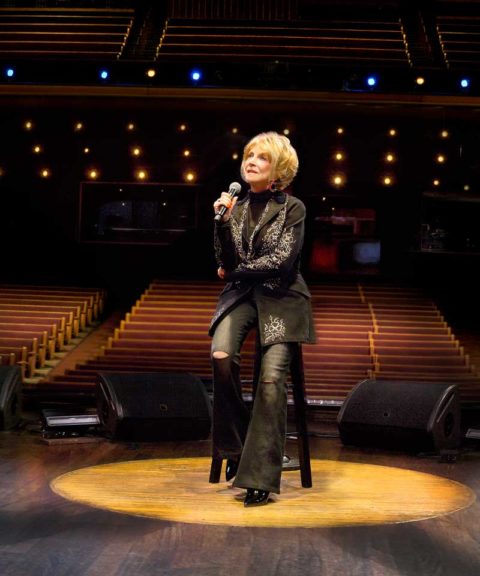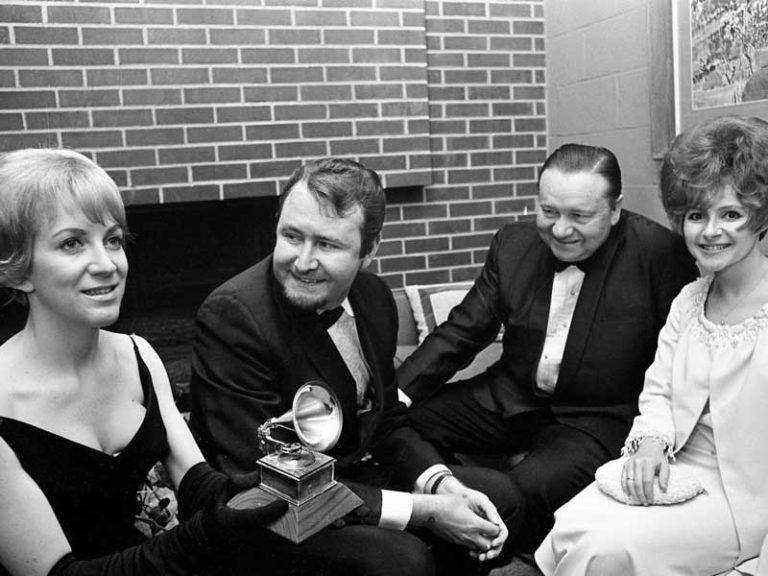As a young performer, at the age of 8, when she heard laughter and applause from the stage Jeannie Seely knew the limelight was for her. A native of Pennsylvania, she came to Nashville via Santa Monica Beach in California. Learn about her circuitous route including a snow drift, a 1958 MGA roadster, and a beach beckoning …
In this Squeeze the Day podcast, Jeannie Seely’s story is laced with today’s maturity and wit along with the naivete of youth. She readily acknowledges a 1961 cross-country excursion like that for young adults at the time was risky, adding that the world seemed a lot safer back then.
 Today, as a Grammy winner and Grand Ole Opry member, Jeannie speaks about the hallowed country music institution and candidly shares about her life and how she is not hesitant to challenge status quo to bring about change for women. Her love for performance including theatre shines as does her desire to explain why an education in business has been such an asset to her as a member of the music industry.
Today, as a Grammy winner and Grand Ole Opry member, Jeannie speaks about the hallowed country music institution and candidly shares about her life and how she is not hesitant to challenge status quo to bring about change for women. Her love for performance including theatre shines as does her desire to explain why an education in business has been such an asset to her as a member of the music industry.
Jeannie’s efforts to encourage equality and freedoms for women are legendary. Today she’s eager to live true to her commitment to lift up others in the community, build bridges across the generations, and inspire the country music artists of tomorrow.
She begins our interview with, “Yes, I’m over 50 and I am living my very best life now” as she underscores the importance of health and wellbeing and finding happiness in all you do.
Q. You touched on your education and how working in a bank and going to night school helped you become a performer. How did you become a member of the Grand Ole Opry?
We listened to the Grand Ole Opry as far back as I can remember. That was what we all looked forward to all week, was Saturday night. My dad always made sure that the car radio battery was charged up in case the Opry didn’t come in on the house radio because of static or whatever. We’d go get in the car and we’d drive around till we did get it. It was that simple. And I’d heard Minnie Pearl, Mr. Acuff and Little Jimmy Dickens. And I loved what I heard and that’s where I wanted to be. I say quite often it was not only important to me to perform on that stage and that show, but I wanted to be a part of that family that I heard. And that’s what my goal was.
 Q. Tell us a bit about your role at the Grand Ole Opry and how you see it as kind of sliding into the role of being the female version of Jimmy Dickens (at the Grand Ole Opry).
Q. Tell us a bit about your role at the Grand Ole Opry and how you see it as kind of sliding into the role of being the female version of Jimmy Dickens (at the Grand Ole Opry).
Jimmy Dickens, in the later years when he wasn’t working the road that much, loved being the opening act on the Grand Ole Opry. He loved welcoming everybody and setting the mood where we’re not all serious. We’re going to laugh and have some fun. That’s what we’re all here for. And I watched him every minute, thinking one day that I would like to be there and doing that. And that’s really where I am now. Because the roads … I’ve been out there, I’ve done that. And it’s harder now. It’s not as much fun to travel as it once was. I just like being home at the Opry now and fortunately I do have that position (now) where I get to do what I learned from Mr. Dickens.
During the interview Jeannie shares about firsts at the Opry including how women earned a more active role to serve as announcers during the program. In addition, she is eager to share the relevance of her wearing a mini skirt on the Opry. At the time she had no idea it would be a precedent setting first for female performers of the time.
 Q. What’s it like to be experiencing a bit of a resurgence of your music when younger and new performers are singing your songs?
Q. What’s it like to be experiencing a bit of a resurgence of your music when younger and new performers are singing your songs?
A. It’s absolutely wonderful to hear younger artists choose a song that I had something to do with, because we live in the most creative, productive city, I think, in the country or in the world. There are so many great songs out there. Anytime anyone chooses one of mine, I’m just absolutely overwhelmed and so grateful.
In our conversations she spoke about being over the age of 50 and how it is so different for females being a songwriter versus a performer … referencing the latter as not always a fair situation. In addition, she talked about her love for embracing technology to learn and do new things.
Q. So how important is mentoring and encouraging the next generation to you?
A. It means a lot to me. It means a lot in some areas that if some of us don’t teach the people coming up, that perspective may be lost. My idea is to teach them, like for instance, the tradition and the meaning of the Grand Ole Opry. What the Grand Ole Opry is and why it is such a treasure. And that, it’s amazing to me when I point out to young people. And this is not like any other venue. If you think it is, name me another one, name me another show or anything that comes close. It is truly something on its own. And the family perspective behind it, appealing to the families out there that you’re reaching out to and entertaining.

Grammy Win, Don’t Touch Me, (L-R-Jeannie-Seely,-Hank-Cochran,-Tex-Ritter,-Brenda-Lee)
Q. Tell us about your Grammy Award winning song “Don’t Touch Me.”
A. That was recorded in 1966. And Hank Cochran had taken me to Fred Foster at Monument Records. And when Fred finally said, “Okay, find us the right song and we’ll go in a record.” So, we started looking through songs and hadn’t found that one thing that just had that magic. I was on the road with Porter Wagoner, in Rochester, New York. Hank was on the road with some songwriters somewhere in Indiana. He (Hank) called me and had the first verse, and he said, “Do you like this?” And truthfully, the first line just knocked me out. “Your hand is like a torch.” And I’m like, “Boy, that describes so very much if you’re saying it to somebody or if you’re hearing it.” She went on to share how the song became a reality … it’s quite a story (with a little scotch mixed in…)
Jeannie also explained how acting was one of those things that maybe saved her life and career and her secrets to remaining healthy and relevant. In addition, she shared about mentors in her life including her husband Gene Ward and good friends and community leaders including Lucy Foutch, and Terri Williams.
Q. What it would it mean to you to be inducted into the Country Music Hall of Fame?
A. I think being inducted into the Hall of Fame validates your life’s work and that you did contribute something. And if it could happen for me, I would like for it to happen while I can still be active and use that platform to be a living example, if you will, of passing that on to younger people. I would make friends and network everywhere you go, and be aware of what your industry needs, as well. I would be tremendously honored to be there with my peers.

 This Squeeze the Day is brought to you by the All of Us Research Program from the National Institutes of Health. Learn how you can help change the future of health by participating in the program.
This Squeeze the Day is brought to you by the All of Us Research Program from the National Institutes of Health. Learn how you can help change the future of health by participating in the program. 